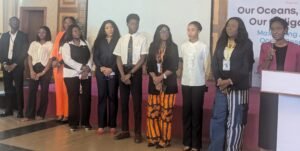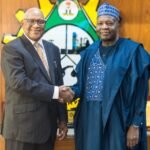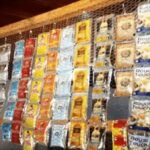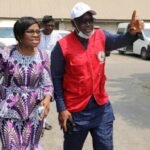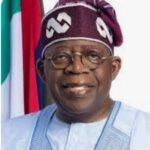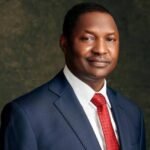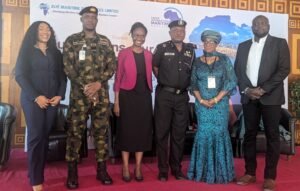
The Managing Director, Fleet Fence Ltr., Mrs Esther Oibo, Rear Admiral Suleiman Ibrahim, the Convener Lagos International Maritime Week LIMWEEK, Mrs Tosan Edodo-Emore, Assistant Commissioner of Police, Odunayo Liasu, Ambassador Florentina Ukonga and President, Maritime Security Provider Association of Nigeria, Mr Emmanuel Maiguea, during the 10th edition of the two-day Lagos International Maritime Week (LIMWEEK) held in Lagos on Monday
LIMWEEK 2025: Linking waterways across 28-state will transform economic -Expert
Dignitaries during the 10th edition of the two-day Lagos International Maritime Week (LIMWEEK) held in Lagos on Monday
Lagos, Sept. 29, 2025, The Chairman of Global Transport Policy (GTP), Dr Olusegun Musa, has urged the Federal Government to link waterways across 28 states for economic transformation.
Musa made the call during the 10th Lagos International Maritime Week (LIMWEEK), a two-day event held in Lagos on Monday.
The 2025 LIMWEEK theme was: ‘Our Oceans, Our Seas, Our Obligation – Maximising Africa’s Ocean’.
According to Musa, Nigeria has about 853 kilometres of coastline offering opportunities in fisheries, oil and gas, shipping, and tourism.
He stressed that 28 of Nigeria’s 36 states possess water bodies which, if linked, could yield huge economic benefits.
Musa said Africa’s Blue Economy was not a distant dream but an immediate opportunity, noting that data on its potential remained underutilised.
He emphasised that fisheries and aquaculture contribute significantly to GDP and food security, adding that aquaculture could address a projected 12-million-tonne fish deficit by 2050.
He cited Egypt’s aquaculture drive and Ghana’s Aquaculture for Food and Jobs Programme as examples of meeting rising protein demands while reducing imports.
Musa said improved regulation could make Africa a net fish exporter, creating livelihoods and boosting nutritional security for its fast-growing population.
He highlighted Africa’s renewable energy potential, noting that South Africa alone could generate up to 900 gigawatts of offshore wind energy.
Wave and tidal energy, he added, offered viable alternatives beyond fossil fuels, unlocking growth while addressing climate change.
Musa noted that maritime tourism generated $80 billion and 24 million jobs in 2018, stressing the need for sustainable, eco-friendly tourism to protect biodiversity.
He described maritime trade, logistics, and ports as Africa’s trade lifeblood, with 90 per cent of international trade passing through them.
However, he warned that Africa’s blue economy faced severe threats, including climate change, sea-level rise, and overfishing, which could destabilise economies and displace communities.
He cited World Bank projections estimating climate damages to major African coastal cities at up to $86.5 billion by 2050.
Musa also warned of declining fisheries, with West Africa’s catch potential expected to drop 30 per cent by 2050, worsened by Illegal, Unreported, and Unregulated (IUU) fishing.
He said IUU fishing deprived local communities, fuelling insecurity and radicalisation, as seen in regions such as Somalia.
On pollution, Musa highlighted persistent oil spills in the Niger Delta and rising marine waste from Africa’s growing coastal populations.
He stressed that oceans should be treated as partners in prosperity, not plundered resources.
In her remarks, Zoe Maritime Resources Chief Executive, Mrs Edodo-Emore, said the International Maritime Business-to-Business Conference was part of World Maritime Day celebrations.
As LIMWEEK Convener, she noted that developing Africa’s ocean resources was crucial to tackling poverty, adding that development could not exist without maritime security.
She said a roundtable on Gulf of Guinea security would examine threats and opportunities for developing Africa’s ocean economy.
Edodo-Emore added that African ports must embrace digitalisation, with Smart Ports reducing vessel turnaround times, improving customs clearance, and ending manual processes.
She said a roundtable on maritime transport and port development would advance discussions on Smart Ports, their opportunities, and challenges
